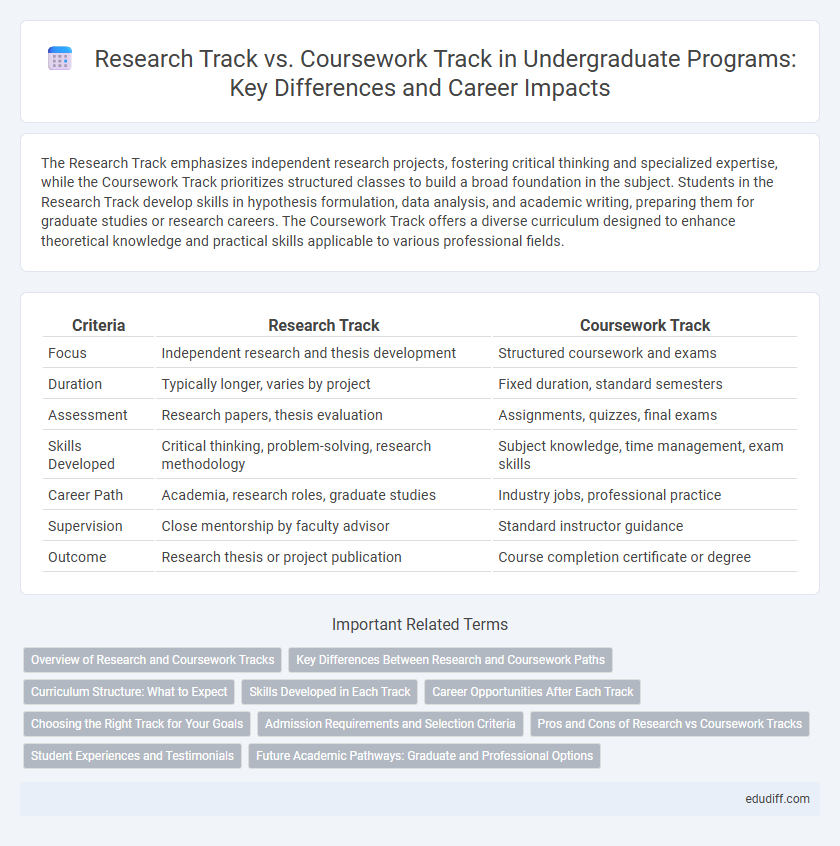The Research Track emphasizes independent research projects, fostering critical thinking and specialized expertise, while the Coursework Track prioritizes structured classes to build a broad foundation in the subject. Students in the Research Track develop skills in hypothesis formulation, data analysis, and academic writing, preparing them for graduate studies or research careers. The Coursework Track offers a diverse curriculum designed to enhance theoretical knowledge and practical skills applicable to various professional fields.
Table of Comparison
| Criteria | Research Track | Coursework Track |
|---|---|---|
| Focus | Independent research and thesis development | Structured coursework and exams |
| Duration | Typically longer, varies by project | Fixed duration, standard semesters |
| Assessment | Research papers, thesis evaluation | Assignments, quizzes, final exams |
| Skills Developed | Critical thinking, problem-solving, research methodology | Subject knowledge, time management, exam skills |
| Career Path | Academia, research roles, graduate studies | Industry jobs, professional practice |
| Supervision | Close mentorship by faculty advisor | Standard instructor guidance |
| Outcome | Research thesis or project publication | Course completion certificate or degree |
Overview of Research and Coursework Tracks
The Research Track in undergraduate programs emphasizes hands-on research experience, requiring students to engage in independent projects, data analysis, and thesis writing to develop critical thinking and problem-solving skills. The Coursework Track focuses on structured classes with a set curriculum designed to build core knowledge in a specific discipline through lectures, exams, and assignments. Both tracks aim to prepare students for advanced studies or professional careers, with the Research Track suitable for those pursuing graduate research and the Coursework Track ideal for practical skill acquisition.
Key Differences Between Research and Coursework Paths
The Research Track emphasizes independent investigation, requiring students to develop hypotheses, conduct experiments, and produce a thesis, fostering critical thinking and analytical skills crucial for academic or scientific careers. The Coursework Track centers on structured classes, focusing on comprehending established theories and practical applications through exams and projects, catering to students aiming for professional qualifications or broader knowledge acquisition. Key differences include the research method, assessment types, and career outcomes, with the Research Track suited for innovation and scholarly pursuits, while the Coursework Track prepares students for industry roles and standardized certifications.
Curriculum Structure: What to Expect
The Research Track in undergraduate programs emphasizes independent inquiry, focusing on experimental design, data analysis, and thesis development, often increasing laboratory and fieldwork hours. The Coursework Track prioritizes a structured curriculum with core courses, electives, and assessments designed to build theoretical knowledge and practical skills through lectures and projects. Students choosing a research path engage deeply with original research guided by faculty, while the coursework path provides comprehensive subject coverage and continuous evaluation.
Skills Developed in Each Track
The Research Track hones critical thinking, data analysis, and independent investigation skills through hands-on lab work, hypothesis testing, and scholarly writing. The Coursework Track emphasizes structured knowledge acquisition, time management, and collaborative learning by engaging with diverse subjects, exams, and group projects. Both tracks develop problem-solving abilities and domain-specific expertise, preparing students for specialized academic or professional paths.
Career Opportunities After Each Track
The Research Track in undergraduate studies enhances skills in analytical thinking and experimental design, preparing students for careers in academia, research institutes, and advanced graduate programs. In contrast, the Coursework Track emphasizes professional knowledge and practical skills, making graduates competitive for industry roles, business management positions, and technical certifications. Choosing the appropriate track impacts career trajectory by aligning educational experiences with specific job market demands and employer expectations.
Choosing the Right Track for Your Goals
Selecting the appropriate undergraduate track depends on your career aspirations and learning preferences. The Research Track emphasizes developing analytical skills and contributing to academic knowledge through independent projects, ideal for students aiming for graduate studies or research-intensive roles. In contrast, the Coursework Track offers structured classes and practical skills, better suited for those seeking immediate industry opportunities or a broad-based education.
Admission Requirements and Selection Criteria
Research Track admission requires a strong academic record, typically a minimum GPA of 3.5, and demonstrated research experience or a compelling proposal aligned with faculty expertise. Coursework Track focuses on broader academic achievement with a minimum GPA of around 3.0 and emphasizes performance in relevant prerequisite courses. Selection criteria for the Research Track prioritize research potential and faculty recommendations, while the Coursework Track evaluates overall academic consistency and course completion.
Pros and Cons of Research vs Coursework Tracks
The Research Track offers hands-on experience with experimental methods, fostering critical thinking and preparing students for graduate studies or research-intensive careers, but it may demand more time and independent work. The Coursework Track provides a structured curriculum emphasizing theoretical knowledge and a broader subject range, ideal for students aiming for professional roles requiring diverse skills, though it might lack deep specialization. Balancing between the two depends on career goals: research-focused paths benefit from the Research Track's depth, while industry-oriented paths often favor the Coursework Track's practical versatility.
Student Experiences and Testimonials
Students pursuing the Research Track often highlight hands-on involvement in experiments and close mentorship from faculty as key factors enhancing their learning and professional development. Those in the Coursework Track emphasize a structured curriculum and diverse subject coverage that strengthens theoretical foundations and prepares them for various career paths. Testimonials reveal Research Track students value deep specialization, while Coursework Track students appreciate broad knowledge acquisition and flexible scheduling.
Future Academic Pathways: Graduate and Professional Options
The Research Track in undergraduate programs cultivates critical thinking and specialized expertise, enhancing admission prospects to competitive graduate schools and research-intensive master's or PhD programs. In contrast, the Coursework Track emphasizes foundational knowledge and broad skill sets, aligning well with professional degrees such as law, business, or education. Choosing between these tracks shapes academic trajectories by tailoring preparation toward research-driven or professional career pathways.
Research Track vs Coursework Track Infographic

 edudiff.com
edudiff.com